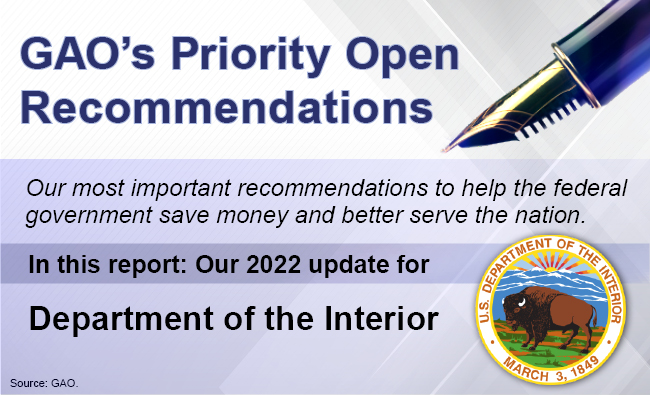Priority Open Recommendations: Department of the Interior
Fast Facts
Each year, we make more than 1,000 recommendations to help improve the federal government. We alert department heads to where they can save the most money, address issues on our High Risk List, or significantly improve government operations.
This report outlines our 13 priority open recommendations for the Department of the Interior as of June 2022. For example, 4 of these recommendations would improve how Interior manages federal oil and gas resources—an issue on our High Risk List.
Since our previous letter in June 2021, Interior has implemented 2 of our priority recommendations.

Highlights
What GAO Found
In June 2021, GAO identified 13 priority recommendations for the Department of the Interior. Since then, Interior has implemented two of those recommendations by, among other things, (1) taking actions to provide tribes with documentation to help identify resources available for tribes to administer certain federal programs using a self-determination contract or self-governance compact, and (2) developing a plan to build schools' capacity to address health and safety issues related to Bureau of Indian Education (BIE) facilities.
In June 2022, GAO identified two additional priority recommendations for Interior, bringing the total number to 13. These recommendations involve the following areas:
- improving oversight of offshore oil and gas activities;
- taking action to ensure special education services at Bureau of Indian Education schools;
- improving Bureau of Indian Affairs' management of energy development on Indian lands;
- addressing Micronesia and the Marshall Islands' transition to trust fund income; and
- conducting strategic workforce planning at the Bureau of Land Management.
Interior's continued attention to these issues could lead to significant improvements in government operations.
Why GAO Did This Study
Priority open recommendations are the GAO recommendations that warrant priority attention from heads of key departments or agencies because their implementation could save large amounts of money; improve congressional and/or executive branch decision-making on major issues; eliminate mismanagement, fraud, and abuse; or ensure that programs comply with laws and funds are legally spent, among other benefits. Since 2015 GAO has sent letters to selected agencies to highlight the importance of implementing such recommendations.
For more information, contact Mark Gaffigan at (202) 512-3841 or gaffiganm@gao.gov.
